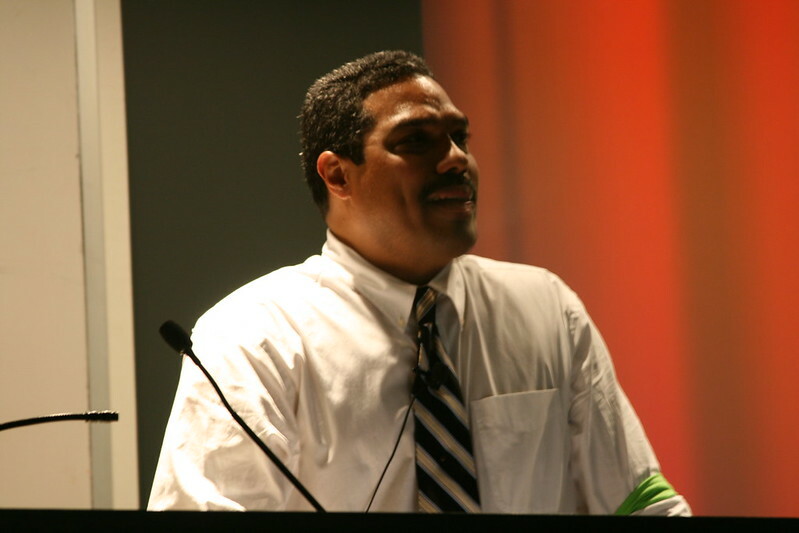Eduardo Bonilla-Silva
Dublin Core
Title
Eduardo Bonilla-Silva
Rights
“Eduardo Bonilla-Silva speaking at Loyola University Chicago” from bourgeoisbee is licensed under CC BY-NC 2.0.
Person Item Type Metadata
Birth Date
1962
Birthplace
Bellefonte, Pennsylvania, United States
Bibliography
Bonilla-Silva, E. (2019). Feeling race: Theorizing the racial economy of emotions. American Sociological Review, 84(1), 1-25.
https://journals.sagepub.com/doi/full/10.1177/0003122418816958Bonilla-Silva, E. (2017). What we were, what we are, and what we should be: The racial problem of American sociology. Social problems, 64(2), 179-187. Accessed July 14, 2022.
Bonilla-Silva, E. (2015). More than prejudice: Restatement, reflections, and new directions in critical race theory. Sociology of Race and Ethnicity, 1(1), 73-87.
Bonilla-Silva, E. (2006). Racism without racists: Color-blind racism and the persistence of racial inequality in the United States. Rowman & Littlefield Publishers.
Bonilla-Silva, E. (2012). The invisible weight of whiteness: The racial grammar of everyday life in contemporary America. Ethnic and racial studies, 35(2), 173-194.
https://www.tandfonline.com/doi/abs/10.1080/01419870.2011.613997Bonilla-Silva, E., Goar, C., & Embrick, D. G. (2006). When whites flock together: The social psychology of white habitus. Critical Sociology, 32(2-3), 229-253.
Bonilla-Silva, E., & Baiocchi, G. (2001). Anything but racism: How sociologists limit the significance of racism. Race and society, 4(2), 117-131. Accessed July 14, 2022.
Bonilla-Silva, E. (2001). White supremacy and racism in the post-civil rights era. Lynne Rienner Publishers.
Bonilla-Silva, E., & Herring, C. (1999). We’d Love to Hire Them, But... The Underrepresentation of Sociologists of Color and Its Implications. Footnotes—The Official Newsletter of the ASA, 27(3), 6.
Secondary Text
Tate, S. A., & Gutiérrez Rodríguez, E. (2022). Critical Race and Gender: Dialogues Between Decoloniality and Intersectionality. In S.A. Tate (ed.), The Palgrave Handbook of Critical Race and Gender, 1-19. Springer International Publishing.
https://link.springer.com/book/10.1007/978-3-030-83947-5
https://link.springer.com/book/10.1007/978-3-030-83947-5
Bergo, B., & Nicholls, T. (Eds.). (2015). “I Don’t See Color” Personal and Critical Perspectives on White Privilege. Penn State University Press.
DiTomaso, N. (2013). The American non-dilemma: Racial inequality without racism. Russell Sage Foundation.
Zuberi, T., & Bonilla-Silva, E. (Eds.). (2008). White logic, white methods: Racism and methodology. Rowman & Littlefield Publishers.
Doane, A. W., & Bonilla-Silva, E. (Eds.). (2003). White out: The continuing significance of racism. Psychology Press.
Doane, A. W., & Bonilla-Silva, E. (Eds.). (2003). White out: The continuing significance of racism. Psychology Press.
Extra Resources
Eduardo Bonilla-Silva, Why Can't We Just Get Along?: Race Matters in the Colorblind Racial Movement. Race Today: A Symposium (2015, July 2). Brown University. YouTube. Accessed July 14, 2022.
https://www.youtube.com/watch?v=T9ChSyjxjUI
Critical Race Theory - Global Social Theory. Accessed July 14, 2022.
https://globalsocialtheory.org/topics/critical-race-theory/
https://www.youtube.com/watch?v=T9ChSyjxjUI
Critical Race Theory - Global Social Theory. Accessed July 14, 2022.
https://globalsocialtheory.org/topics/critical-race-theory/

